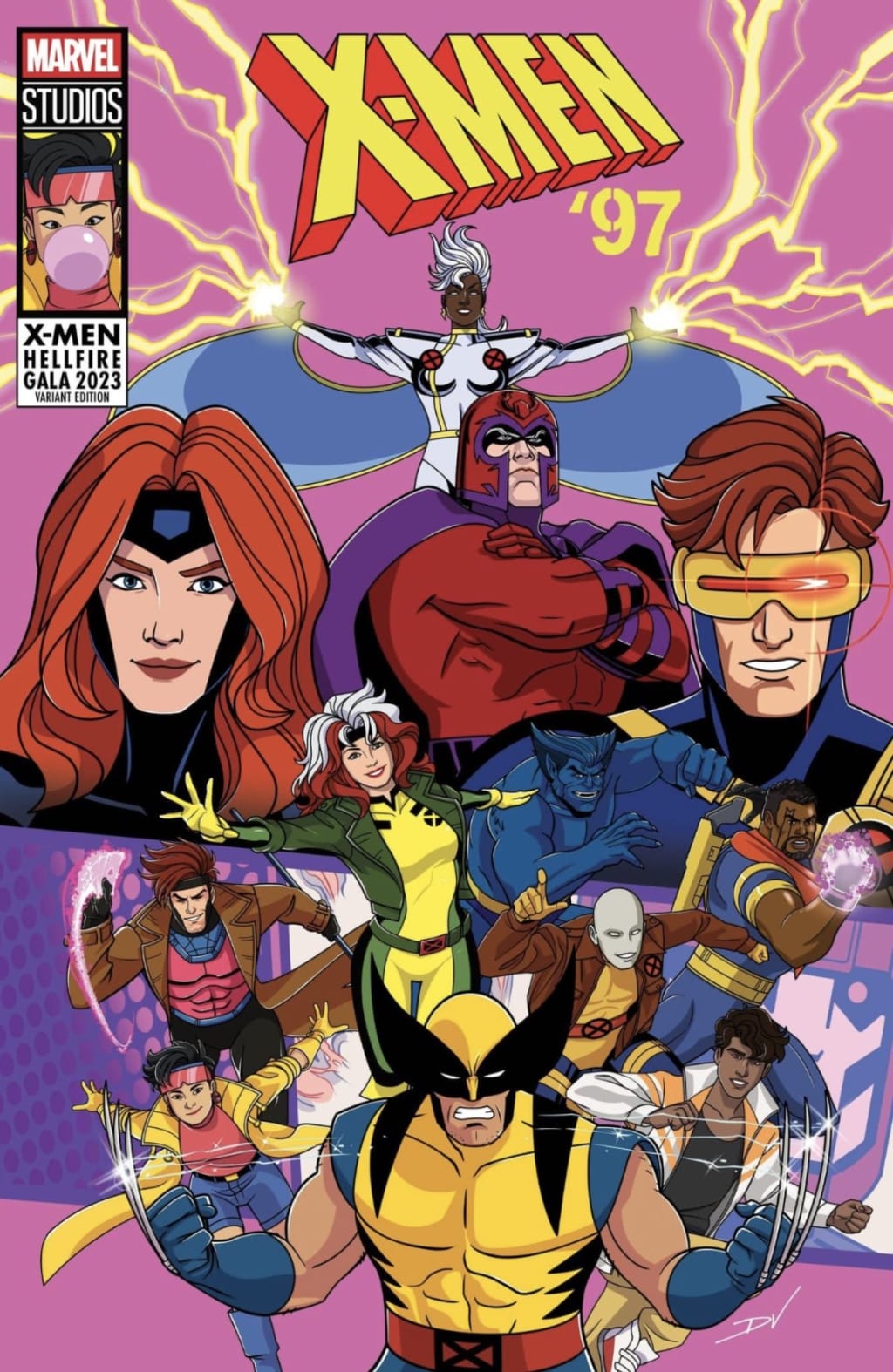Newsflash: X-Men Has Always Been “Woke”
It’s always been “woke” since the 1960s.

During the unprecedented global shutdown caused by the COVID-19 pandemic, I sought solace in the world of television. Among the shows that caught my attention was the original X-Men: The Animated Series. Along with Star Wars: The Clone Wars, it became a nightly ritual for me to watch three episodes on Disney+ before retiring to bed. This routine provided a much-needed escape from the stress of the day, during which I was preoccupied with planning and writing articles, including a series of interviews.
As a dedicated Marvel fan, I've always been drawn to anything related to Marvel comics, the Marvel Cinematic Universe, fan fiction based on my favorite Marvel films, and cosplaying as my beloved Marvel characters. The X-Men series, with its rich history and captivating storylines, naturally piqued my interest.
Watching the series was a delightful experience. I reveled in the way it took classic stories from the 70s and 80s and expanded upon them. Having already developed a fondness for the X-Men through comics and other animated shows like X-Men: Evolution and Wolverine and the X-Men, I was eager to delve deeper into their world. The show, much like the comics and later iterations introduced in the 2000s, revolves around a team of extraordinary heroes, each born with unique superhuman abilities. Under the guidance of the wise and compassionate Professor Charles Xavier, they face an array of challenges, often stemming from the relentless persecution they endure because of their extraordinary gifts.
Throughout the series, I found myself captivated by the intricate character development and thought-provoking themes it explored. The struggles, triumphs, and complex relationships among the X-Men resonated deeply with me. The show's depiction of their fight for acceptance, equality, and understanding in a world that feared and misunderstood them was poignant. Watching X-Men: The Animated Series during the quarantine period provided me with a profound sense of connection and inspiration. It reminded me of the strength and resilience of the human spirit, even in the darkest of times. The show's message of hope, unity, and acceptance resonated with me deeply, offering a much-needed source of positivity and light during a challenging period.
With the recent release of the trailer for the upcoming sequel series "X-Men '97," a surge of self-proclaimed right-wing trolls has emerged, labeling the diverse cast and hinted storyline as "woke." This attempt to disparage a show featuring characters significant to the broader Marvel Cinematic Universe is not only irksome but also shows their unfamiliarity with the comics that serve as its foundation.
X-Men has consistently been a progressive and socially conscious franchise. Let's delve into its history to understand why:
History of The X-Men: Why They Were Created
The well-known mutants known as the X-Men were initially created by Stan Lee and Jack Kirby in 1963 for the first issue of the Uncanny X-Men comic book. The characters and their struggles serve as allegories for the Civil Rights Movement. The mutant gene grants the characters a variety of powers, including telepathy, phasing through solid matter, super speed, energy blasts, telekinesis, and shapeshifting. Despite facing constant persecution simply for being who they are, the X-Men are committed to protecting their non-mutant world from experiencing the same prejudice and bigotry that they endure.
However, it was not until the 1970s that the X-Men became one of the most popular comic book series in Marvel's history. This was because of writer Len Wein and artist Dave Cockrum's introduction of seven new characters, including Storm, Nightcrawler, and most notably, Wolverine. This new era of the series received great critical acclaim and produced some of the most iconic storylines in its history, such as the Dark Phoenix Saga, the Proteus Saga, Days of Future Past, and God Loves, Man Kills. These stories all focused on the ongoing prejudice and bigotry that mutants faced from their non-mutant counterparts and their desire to end it once and for all.
Both the 1990s animated series and the upcoming sequel series are based on the original, long-running All-New, All-Different X-Men series from the 1970s and 1980s. One significant difference between this series and the original 1963 run was the new, multicultural roster of characters led by Storm, an African goddess who eventually became queen of Wakanda in a 2005 Black Panther run following her marriage to King T'Challa. The original team, in contrast, consisted entirely of white characters.
About the Non-Binary Mutant
Many are criticizing the upcoming X-Men'97 show due to Morph's portrayal as non-binary. As a fan who appreciates the series' exploration of social injustices, I find this criticism unwarranted.
Morph's gender identity aligns with X-Men's tradition of tackling issues like racism, prejudice, and LGBTQ+ representation. Using they/them pronouns isn't harmful, and speculations about romance are irrelevant to the character's development. Furthermore, Morph isn't alone: NorthStar, Iceman, Deadpool, and Escapade all represent diverse sexualities and gender identities within the X-Men universe. Mystique's long-standing lesbian relationship further cements this commitment to inclusion.
Therefore, complaints about Morph's non-binary identity seem unfounded considering X-Men's established history of diverse representation.
There’s No Ignoring Political Or Social Issues With X-Men
The X-Men have always been deeply intertwined with political and social themes. From the allegory of the AIDS epidemic in The Legacy Virus to Magneto's Holocaust-inspired origin story, the series has tackled complex issues like discrimination, prejudice, and government overreach. Characters like Storm and Kitty Pryde further explore these themes, facing bigotry not only as mutants but also as Black and Jewish individuals, respectively.
Subplots like the Mutant Registration Act and the threat of genocide in Days of Future Past directly echo real-world concerns about government control, civil liberties, and ethnic cleansing By drawing parallels to real-world struggles, the X-Men encourage readers to reflect on injustice and fight for equality. Removing these core elements would alter the series' identity.
Claiming Disney can't write political X-Men stories is inaccurate, as the series has always been political. Attempting to appease a small group by erasing this core aspect would be impossible and detrimental to the series' legacy.
One More Thing My X-Men
While the X-Men, like many fictional narratives, doesn't provide definitive solutions to complex issues like prejudice and discrimination, its exploration of these themes has always been fundamental to its identity. Dismissing these elements as "woke" or solely targeted at conservatives ignores the long history and significance of these explorations within the series.
Similar themes of rebellion against oppression and seeking understanding amidst conflict can be found throughout popular fiction, including Star Wars' anti-war messages. Labeling entire works as simply "woke" can hinder appreciating the diverse storytelling that can resonate with various audiences.
Ultimately, the choice to engage with and interpret fiction lies with each individual. If the current direction of the X-Men doesn't resonate with you, there are certainly other narratives to explore. However, dismissing the series' core themes because of personal disagreement may limit your understanding of its lasting impact and potential for meaningful discussion.
About the Creator
Jenna Deedy
Zoo and Aquarium Professional, Educator, Cosplayer, Writer and B.A. in Psychology whose got a lot to share when it comes to animals, zoos, aquariums, conservation, and more.
Instagram: @jennacostadeedy






Comments
There are no comments for this story
Be the first to respond and start the conversation.